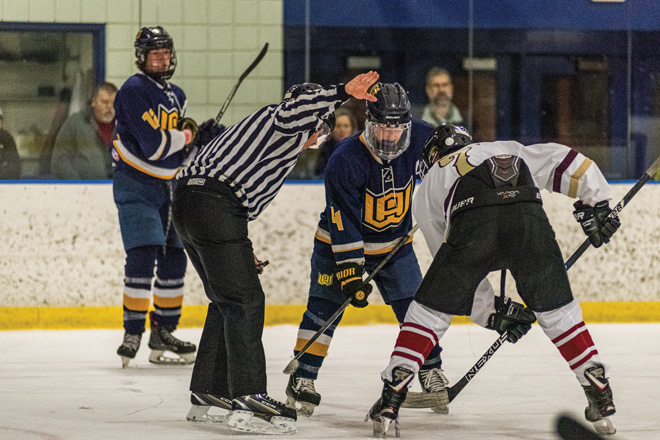Article by Ed Griffin, Pomfret School
Feature image: While officiating, Griffin communicates with players through hand signals. Photo courtesy of Ed Griffin.
From the time I was five years old, I have loved ice hockey, though I was not always the best player. I lacked the appropriate aggressiveness and speed, and I was a bit undersized. I could not put any weight on my slight frame (wish I still had that problem), and I was getting knocked around pretty well with the introduction of body checking at the high school level. When I got cut from my youth team at the age of 15, I looked for a way to turn my passion for the sport in a new direction.
My mother knew the in-house leagues — where players of any skill level compete recreationally — were looking for referees. So, I signed up. Soon enough, I was on the ice, refereeing games for mites, the youngest players in USA Hockey. This was so long ago that ice hockey officials did not wear helmets, and I doubt I signed many of the liability waivers required today. In retrospect, I look back and shudder that the world thought it was an acceptable risk management practice to have a 15-year-old official referee hockey games with no helmet, no mentoring and no training. It was a simpler time.

I had a great experience refereeing during my high school years and, apart from a short break in college, have continued ever since. I can say that many of the bonds formed over those years still exist today. I’ve interacted with many players, coaches, parents and fellow officials over the years, and I wouldn’t trade that experience for the world. Officiating can be lonely, and it is a rarity when you don’t get unsolicited advice from the many “referees” in the crowd. But it is comforting to be in lock step with my partners on the ice who provide the needed unconditional support from game to game.
I also had the pleasure of officiating some talented players. In fact, I regularly refereed Chris Clark when he was a seven-year-old wizard with the puck. He went on to have a storied NHL career, playing for multiple teams over a 12-year period.
Hockey has always been integral to my personal development — from becoming a young man, to first starting my career as an accountant, to becoming someone who now receives AARP’s magazine. In my current job as chief financial officer, it is important to be able to view issues and challenges from a multitude of perspectives. As a player, coach and most importantly a referee — although we prefer the term official — I’ve learned to navigate difficult circumstances with adults who were blinded by their biases.
Good officials do not become part of the story; they simply adjudicate the playing rules to ensure a level playing field, usually resulting in the team that played best that day leaving with the “W.” My goal has always been to work the game and be forgotten. If the game ends and the spectators are talking about the great play in the second period or the game-winning goal in overtime, I’ve done my job.
Good officials do not become part of the story; they simply adjudicate the playing rules to ensure a level playing field, usually resulting in the team that played best that day leaving with the “W.”
Much like officials, independent school officers implement and administer policies and procedures that are intended to treat all business employees in an equal and consistent manner. This approach creates institutional transparency and solves an important goal — setting clear expectations — much like a rule book.
Officiating is hard, and mistakes occur. The same could be said for the business office. I find it is best to own your mistakes, be transparent, have difficult conversations every single day, and know that we will all be judged holistically and not on any one single penalty call, judgment or decision.
Ed Griffin is chief financial officer at Pomfret School, a grades 9–12 school with 350 students in Pomfret, Connecticut. He was a 2019 recipient of the NBOA Will J. Hancock Unsung Hero award, given to business officers who have made extraordinary contributions to their schools and exemplify exceptional integrity, knowledge and motivation.
We’d love to hear from you! In After School, business officers share a passion or perspective from outside their usual working hours. Want to contribute? Email NetAssets@nboa.org. In the subject line, type AFTER SCHOOL.



